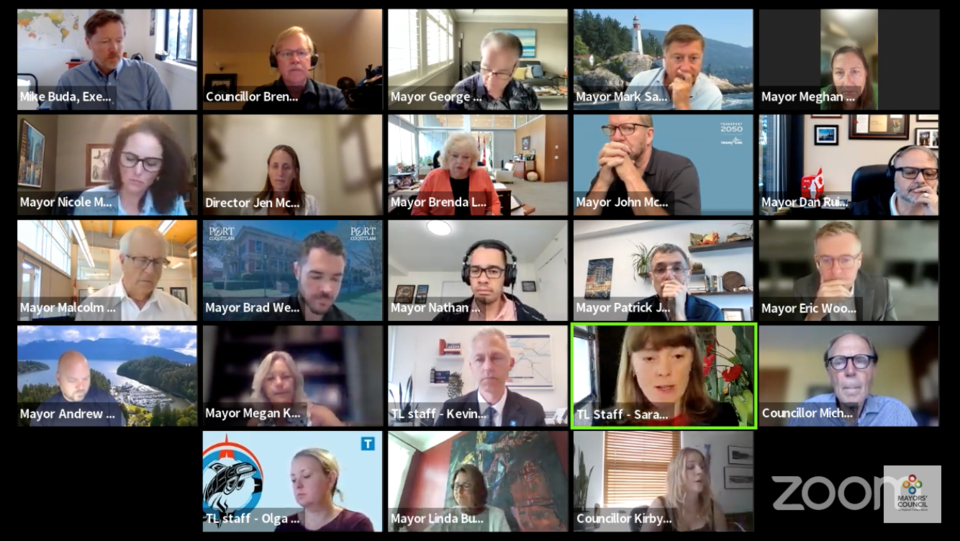Metro Vancouver mayors are ringing alarm bells that the region’s transportation system faces “catastrophic” cuts without more stable provincial and federal government funding.
At their nearly monthly Mayors’ Council meeting, held online via Zoom on July 25, the mayors discussed a report from TransLink indicating a looming $580-million annual deficit in 2026, left unaddressed, will lead to up to 50 per cent in transit service reductions.
What the mayors did not discuss is the latest statutory financial report from TransLink, the region’s transportation authority, showing their soaring salaries.
In 2019, politicians on the Mayors’ Council were paid $262,404 by taxpayers in meeting fees, after 11 regular meetings. Fast forward four years, in 2023, the politicians approved $471,010 in salaries for themselves, a 79 per cent increase. In 2023, only nine regular meetings were held by the council. In that same period, council expenses nearly tripled, from $12,555 to $33,358.
Mayors’ Council chair Brad West, the mayor of Port Coquitlam informed Glacier Media the council has had more committee meetings and this accounts for the higher payments, which are pegged to inflation.
This month’s meeting commenced with the election of Richmond Mayor Malcolm Brodie as vice-chair after having been the designate to the board of directors, a position for which he was paid $40,200 in 2023. Brodie replaced Burnaby Mayor Mike Hurley, who assumed the role of Metro Vancouver chair this month.
Pitt Meadows Mayor Nicole MacDonald was then elected as the new designate to the board of directors.
At the meeting, several politicians cited the need for the council to be transparent, especially with respect to the looming cuts.
West said “none of us want to paint scary pictures of doom and gloom,” however “the consequences outlined in this report are hard to imagine.”
West’s salary as the chair for nine meetings in 2023 was $36,850. In 2019, chair Jonathan Cote was paid $ 21,548 ($16,548 plus a $5,000 retainer).
At issue is what TransLink calls a “structural deficit” wherein federal and provincial government funding has not kept up with record population growth from immigration (and thus increased demand on the system).
The lack of funding is compounded by lower gas tax revenue, maintaining fare increases below inflation since 2020 (to maintain affordability) and inflationary costs for operating and capital expenses, said TransLink CEO Kevin Quinn, whose salary breached half-a-million dollars in 2023, to $507,636, as compared to the position’s contract of $445,182 in 2019, for then CEO Kevin Desmond.
Last month, Quinn announced $90 million in internal cost-cutting measures, according to a June 27 Ernst & Young LLP efficiency review report from Olga Kuznetsova, vice-president of financial services.
“As CEO, I’m committed to the highest level of transparency,” said Quinn, at the meeting.
The Mayors’ Council also voted to send a letter to the provincial political parties vying to be elected asking them to support a new, senior government-funded $500-million annual fund indexed to inflation for TransLink alone plus an annual $3.9-billion purse for national transit projects, including in Metro Vancouver.
The Mayors’ Council oversees and approves the funding mechanisms for TransLink, such as fares and property and gas taxes, and it's been around this block before; reluctant to raise property taxes in 2015, the council took to a referendum; however, the public voted against a $7.5-billion regional transportation plan to be funded by a 0.5 per cent sales tax.
Dire warnings of transit cuts from the council were made then, as they are being made now.
City of North Vancouver Mayor Linda Buchanan, whose standard council salary reached $17,420 in 2023, up from $9,456 in 2019, called the proposed cuts “catastrophic.”
The council received a report from Sarah Ross, TransLink’s vice-president of transportation planning and policy that outlined massive proposed cuts to transit service if the $580-million gap isn’t closed (the gap has been temporarily closed to the end of 2025 with a $475-million provincial government grant).
“Transit reductions would be in the range of 45-50% overall and include elimination of entire routes plus significant reductions in frequency and start/end times of service. This would include cancelling approximately 145 bus routes, significantly reducing SkyTrain, SeaBus and HandyDART service, and potentially eliminating the West Coast Express. Funding for walking, cycling, and roads programs would also be cut,” the report stated.
“More than half a million people would no longer be within walking distance of transit, and 175,000 jobs, or more, would no longer be accessible by transit” and “access to jobs will decline — 265,000 jobs no longer within walking distance to a transit stop,” added Ross.
West said the federal government has only provided a “repackaging” of transit funding announcements this year. The mayor the funding has not met the demands put on the system by population growth from record-setting immigration since the pandemic.
Vancouver city councillor Sarah Kirby-Yung then denounced anyone blaming immigration, saying immigrants are needed to fill jobs and the council should “push back against any undercurrent of racism or racist tropes.”
This article was updated July 25 to reflect comments from West about committee meetings




